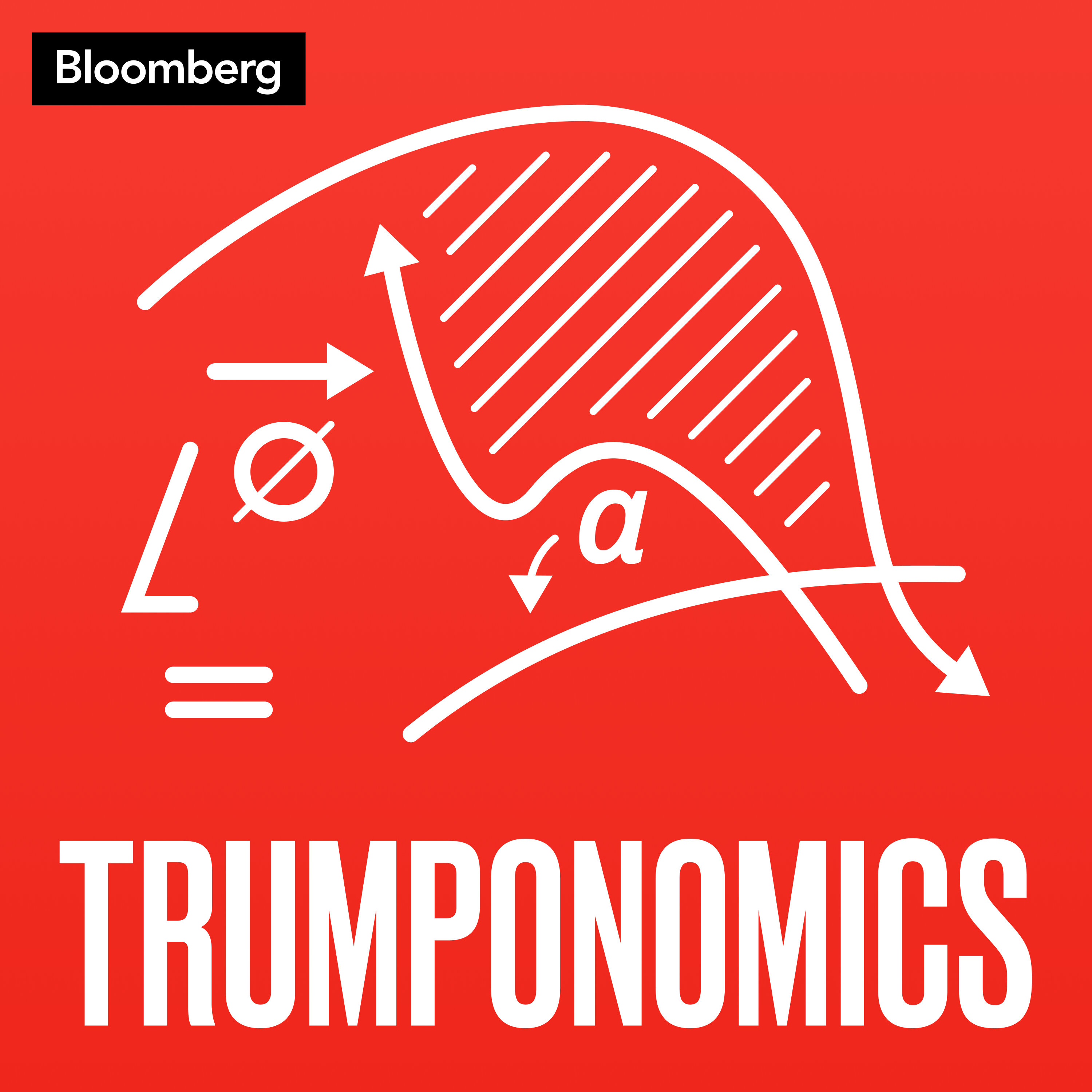

Trumponomics
Bloomberg
Tariffs, crypto, deregulation, tax cuts, protectionism, are just some of the things back on the table when Donald Trump returns to the Presidency. To help you plan for Trump's singular approach to economics, Bloomberg presents Trumponomics, a weekly podcast focused on the Trump administration's economic policies and plans. Editorial head of government and economics Stephanie Flanders will be joined each week by reporters in Washington D.C. and Wall Street to examine how Trump's policies are shaping the global economy and what on earth is going to happen next.
Episodes
Mentioned books

Jun 3, 2024 • 35min
US Battles for ‘Hearts and Minds’ in a Conflicted World with Daleep Singh
On this special Monday episode, White House national security adviser for economics Daleep Singh explains how America is seeking to maintain global influence. Bloomberg senior editor Ruchi Bhatia discusses the likely victory of Prime Minister Narendra Modi’s party in India’s election and what it means for the world’s fastest-growing major economy. And Stephanie and Allegra discuss the election results in South Africa and Mexico. See omnystudio.com/listener for privacy information.

May 31, 2024 • 19min
South Africa is in Uncharted Waters. What's Next?
For the past three decades, South African politics have been defined by the African National Congress. But with initial forecasts from the May 29 vote showing a marked decline in support for the ruling party, change looks likely. So what do the various potential outcomes mean for South Africa’s growth and debt outlook? For investor interest in the country? Bloomberg Opinion columnist Adrian Wooldridge and Senior Executive Editor Jacqueline Simmons review the landscape with Bloomberg economist Yvonne Mhango.See omnystudio.com/listener for privacy information.

May 24, 2024 • 39min
How to Beat Back AI’s Threat to Democracy with Audrey Tang
Bad actors using machine-learning, generative artificial intelligence and the power of digital networks are seeding ever-more distrust in democracy, warns Audrey Tang, former digital affairs minister for Taiwan. Tang joins this week’s episode of Voternomics to discuss the risk of foreign interference in the many elections happening around the world, as well as lessons learned while combating efforts to distort the political debate in Taiwan. Plus, Bloomberg political correspondent Nancy Cook discusses the latest Bloomberg News/Morning Consult polling which reveals the unease voters feel around the US election—from misinformation to political violence and foreign interference.See omnystudio.com/listener for privacy information.

May 22, 2024 • 15min
Voternomics: "Bleeding to Death" Tory Party Calls July Election. Why Now?
On this special edition of Voternomics, we discuss the possible reasoning behind the Conservative’s decision to gamble on an earlier-than-expected vote. See omnystudio.com/listener for privacy information.

May 17, 2024 • 50min
Voternomics: Why Europe Needs to Unite Around Its Defense with Wolfgang Ischinger
Former Munich Security Conference Chair Wolfgang Ischinger joinsVoternomics to explain the new European project he says is needed. Plus, Bloomberg reporter Michael Nienaber discusses why German Chancellor Olaf Scholz’s popularity remains at historic lows while the far-right AfD party may see gains in the European parliament next month. See omnystudio.com/listener for privacy information.

May 10, 2024 • 41min
Voternomics: What’s Worse Than Inflation? ‘Useless Politicians’
Ben Page, chief executive of market research company Ipsos, joins Voternomics this week to outline what he’s discovered about voters and what they think about their politicians, governments and economies. He tells Stephanie Flanders and Allegra Stratton that trust in politics is the “lowest we’ve ever measured.” Also on this episode, Flanders, Stratton and Adrian Wooldridge ask Bloomberg Opinion columnist John Authers whether—given the question of when the Federal Reserve will cut interest rates between now and the election—the central bank can remain above the political fray.See omnystudio.com/listener for privacy information.

May 3, 2024 • 39min
Voternomics: Why Politicians Are Paying the Price for Central Bank Sins with Karen Ward
Karen Ward, J.P. Morgan Asset Management's chief market strategist, discusses the consequences of central bank mistakes on politicians with Stephanie Flanders. They delve into the impact of inflation on global economies. Also, insights on Elon Musk's influence on US-China relations are unpacked by Bloomberg News editor Craig Trudell.

Apr 26, 2024 • 51min
Voternomics: Why the US Election Isn’t About Foreign Policy with Niall Ferguson
Historian Niall Ferguson and Bloomberg reporter Nancy Cook discuss the US election's global impact, Trump's campaign strategy, and the escalating second Cold War. The podcast explores voter behavior, economic challenges, US-China relations, and the evolving political landscape in a unique and informative way.

Apr 22, 2024 • 2min
Stephanie Introduces Her New Series "Voternomics"
Stephanie is back with a new podcast series.This is the year of elections. Around 40 percent of the world has the chance to vote in 2024. And those votes will shape the geo-economic landscape for years to come.The implications for business and democracy are huge and worth exploring, which is why Stephanie is joining Opinion columnist Adrian Wooldridge and Bloomberg contributor and former government advisor Allegra Stratton for a new series called “Voternomics.”It’s a weekly look at the way geopolitics - and elections - are upending the longstanding assumptions of policymakers and business people around the world. In short, it’s a series about how elections mean business.Don’t miss the first episode coming this Friday. See omnystudio.com/listener for privacy information.

Mar 26, 2024 • 1min
Listen Now: The Big Take
The Big Take from Bloomberg News brings you inside what’s shaping the world's economies with the smartest and most informed business reporters around the world. The context you need on the stories that can move markets. Every afternoon.See omnystudio.com/listener for privacy information.


